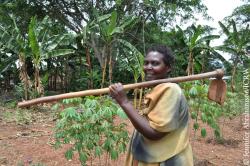
ICRW chief advocates for women’s issues on President Obama’s Global Development Council
Adolescent Girls, Adolescents and Youth, Child Marriage, Clean Energy, Economic Opportunity & Security
21 April 2014
Media Contact
President Obama’s Global Development Council held its first public meeting at the National Press Club in Washington, DC on Monday, April 14. The Council convened to share with the public its first set of recommendations to strengthen U.S. global development policies and practices, and to solicit public input on key global development issues.
Late Monday, the Global Development Council met with President Obama at the White House along with administration officials, including Secretary of State John Kerry, Defense Secretary Chuck Hagel, and U.S. Agency for International Development Director Raj Shah.
The Council released its first set of recommendations presented in a document titled “Beyond Business as Usual”, in which it has identified four areas that “cut across all development sectors.” The four focus areas are: Harnessing the Private Sector; Innovation, Transparency, and Evidence-Based Policy; Climate-Smart Food Security; and Global Leadership.

ICRW President Sarah Degnan Kambou, member of the Global Development Council, has advocated for the Council to ensure that gender equality and women’s empowerment are integrated throughout the recommendations. This is particularly evident in the third focus area, Climate-Smart Food security, which focuses on the particular challenges women and girls face in land tenure, agriculture, nutrition, and climate change.
The Council’s report notes “given that the world’s poorest, particularly women, suffer disproportionately from climate change, any forward-looking development agenda must address the impacts of climate change.” The report emphasizes that the key to success in this arena is a greater focus on empowering women in agriculture and conservation, and highlights that “this should address securing the land tenure and stewardship rights of women, as well as the inheritance rights of daughters.”
Moreover, the Council also endorsed the United Nations High-Level Panel’s recommendations for the post-2015 development framework, which has a stand-alone goal on gender and specific targets on child marriage, women’s property rights, eliminating gender-based violence, and promoting sexual and reproductive health and rights, among other key provisions.
This is particularly encouraging as ICRW research and evidence demonstrates that the empowerment of women and girls is vital to creating effective global development policies that yield significant results.
For nearly four decades, ICRW has examined how disparities between women and men affect agricultural productivity and food security. Women’s contributions to the agricultural sector often go unrecognized and societal views of women’s roles limit their access to land ownership, credit, and farm equipment. Further, restrictions on women’s property rights not only prevent women from providing for themselves and their families, it significantly hampers global progress in economic growth, poverty reduction, and gender equality.
 In a report published last month, ICRW and partners examine the importance of women’s land and property rights in the contexts of HIV and AIDS, violence against women, and food security. Research evidence demonstrates that when women own land and other assets, their agricultural productivity increases and their children are healthier. Having property rights also gives women greater bargaining authority within households, which helps reduce their vulnerability to domestic violence and HIV infection.
In a report published last month, ICRW and partners examine the importance of women’s land and property rights in the contexts of HIV and AIDS, violence against women, and food security. Research evidence demonstrates that when women own land and other assets, their agricultural productivity increases and their children are healthier. Having property rights also gives women greater bargaining authority within households, which helps reduce their vulnerability to domestic violence and HIV infection.
Although there are laws in some countries that protect women’s property rights, many women cannot realize their rights. This is often due to women’s lack of awareness about their legal rights, and lack of access to legal aid and services. To address such challenges, there has been a rise in public and NGO-supported community-based legal aid programs, developed to train community members to provide legal aid and education to their neighbors in need.
A new ICRW evaluation summary report details lessons learned from one such community-based legal aid program developed to support women’s property rights in Uganda. ICRW and the Ugandan Land Alliance (ULA) have trained and supported a group of about 40 community members to educate others about existing laws on property rights in order to increase knowledge and change norms related to women’s ownership of property. Referred to as “paralegals,” these legal rights workers often help mediate land and other disputes when they arise.
The evidence is overwhelming. More and more research evidence to date clearly demonstrates that empowering women is vital to global development efforts to reduce global poverty. Collaborating with local partners, ICRW designs effective programs that help empower women and address the world’s toughest challenges.
The Council’s memo to the President is great step in the right direction and is heartening to all who work for women’s rights and effective global development.
Related stories:
Not Up for Grabs: Protecting women’s land and property rights in Uganda by Jennifer Abrahamson
For more information on the Global Development Council meeting, read statement released by the White House.
